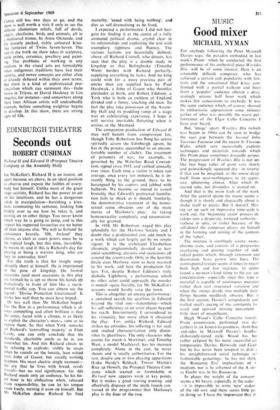EDINBURGH THEATRE
Seconds out
ROBERT CUSHMAN
Richard II and Edward II (Prospect Theatre Company at the Assembly Hall) Ian McKellen's Richard II is an ironist, set apart because set above, in an ideal position to observe and expose the foibles of every- body but himself. Unlike most of the great stage satirists, Richard has the power to act on his intuitions, and he has a dangerous relish in manipulation—banishing a kins- man, commuting his sentence, looking him briskly over to see how he takes it, and passing on to other things. You never know which way he is going to jump, and in this respect his supposed favourites are no better off than anyone else. 'We will to Ireland' he announces bravely. 'Oh, Ireland' they chorus, as alert as court jesters must be to the topical laugh, but this time, incredibly, he means it; and if this is Richard's day for playing at being a warrior king, who are they to contradict him?
For the truth is that his insight stops abruptly short at himself. He is imprisoned in the pose of kingship. On formal • occasions (and most occasions in this play are formal) he is apt to throw his hands tip protectively in front of him like a sacra- mental traffic cop. You can almost see the legend: 'Divine Protection Guaranteed'. It works less well than he must have hoped.
Or less well than Mr McKellen hoped. For the flaw in a performance which is al- ways compelling and often brilliant is that the actor, faced with a climax, is as likely to exploit the character's maim,. isms as to expose them. So that when York remarks on Richard's 'controlling majesty' at Flint Castle, one can only conclude that his standards, charitable uncle as he is, are somewhat lax. And this Richard cheats us by refusing to explode; visibly he snaps when he rounds on the lunatic, lean witted fool, John of Gaunt, but vocally nothiirg happens. His most electric single moment— the cry that he lives with bread, needs friends—has no real significance. for this Richard needs only an audience. So his fin- est hour is his abdication when, released from responsibility, he can let his tongue roam freely, turning it even on himself. But Mr McKellen denies Richard his final
maturity, 'eased with being nothing', and dies as self-dramatising as he lived.
I expected a performance. I did not bar- gain for finding it at the centre of a fully animated political drama, crystal clear in its relationships and exploiting the text with exemplary rightness and fluency. The various factions are beautifully defined; above all Richard Cottrell, who directs, has seen that the play is a double study in kingship so that Bolingbroke (Timothy West) meshes with Richard perfectly, supplying everything he lacks. And no king could wish for a more precious pair of uncles than are supplied here by Paul Hardwick, a John of Gaunt who throttles platitudes at birth, and Robert Eddison, a York who is both an emblem of England divided and a funny, touching old man. To feel the play take possession of the Assem- bly Hall and its prodding ramp of a stage was an exhilarating experience. 1 hope it will survive inevitable flattening when it arrives at the Mermaid.
The companion production of Edward II may well benefit from compression for,
though Toby Robertson has flung his actors spiritedly across the Edinburgh apron, he has in the process succumbed to an uncom- fortable number of clichés. The treatment of prisoners of war, for example, is governed by the Waterloo Road Conven-
tion, signed circa 1953, and ratified annually
ever since. Each time a victim is taken (on average, once every ten minutes), he is in- stantly flung to the ground, there to be harangued by his captors and jabbed with halberds. We become so inured to casual brutality that Edward's protracted humilia- tion fails to shock as it should. Similarly, the demonstrative treatment of the homo- sexual scene obscures one of the main merits of Marlowe's play: its taking homosexuality completely and unsensation- ally for granted.
In 1958, Mr Robertson staged this play splendidly for the Marlowe Society and I doubt that a professional cast add much to a work which can largely get by on simple vigour. It is the archetypal Elizabethan chronicle, singlemindedly devoted to bar- onial squabbling, alarums and excursions all around the countryside. Only in the horrible finale does Marlowe seem to have warmed to his work, and here the production fal- ters. For, despite Robert Eddison's truly diabolic Lightborn, a performance which no other actor could approach, the murder is muted—quite literally, for Mr McKellen's screams would hardly raise the town.
This is altogether an uneasy performance: a sustained search for qualities in Edward beyond the vital one—dependence—which his self-sufficiency as an actor places beyond his reach. Intermittently I surrendered to his virtuosity, but more often it obscured the play. For, unlike Richard, Edward strikes no attitudes: his suffering is for real. and studied characterisation only dimin-
ishes its ghastliness. The only character who
counts for much is Mortimer. and Timothy West, a model Machiavel, has his measure completely. Alone in the cast, he never shouts and is totally authoritative. For the rest, despite one or two pleasing apparitions (Luke Hardy's Baldock. Trevor Martin's Rice ap Howel), the Prospect Theatre Com- pany which seemed so formidable in
Richard now appears weak at key points. But it makes a good rousing evening. and effectively disposes of the myth (much can- vassed in the programme) that Marlowe's play is the finer of the two.


































 Previous page
Previous page